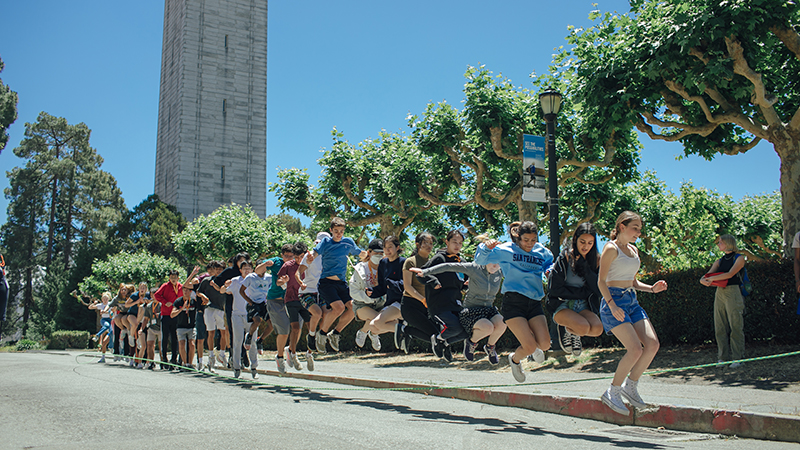
This summer a record number of high school students participated in TFAS’s high school residential week-long programs through the Foundation for Teaching Economics (FTE). These programs exposed 928 students from 29 countries to the economic way of thinking on domestic and global issues. Throughout their journey, students acquired the skills they will need to become effective leaders.
This year, TFAS offered 18 in-person Economics for Leaders (EFL) programs throughout the United States on university campuses. Students gained knowledge of economic and leadership concepts behind the economic way of thinking, as well as how to apply these ideas to the daily decisions that business and governmental leaders make. The program is also conveniently offered online.
The lectures were always followed with activities that modeled the concepts we covered, which proved key in allowing the knowledge to easily stick in my mind. I can undoubtedly say that during my economics class this year, I will use the knowledge I gained to solidify my understanding of economics.” – Christy Guan, EFL ’22

This year’s programs had 725 participants, making it the largest FTE summer thus far. In-person cohorts appreciated the interactive and fascinating course that Dr. Ken Leonard, associate vice president for the Foundation for Teaching Economics, Dr. Greg Caskey, assistant professor of economics at The Citadel and Dr. Jamie Wagner, associate professor of economics at the University of Nebraska at Omaha offered.
During these week-long programs, high school students are able to get a taste of campus life by living and learning at colleges in the U.S. Program sites included: University of Texas, Yale University, Rice University, Washington University, UC Berkeley, UCLA, Tufts University, Cornell University, Emory University, UC Santa Barbara, University of Michigan and University of Washington.
Dr. Ninos Malek, professor of economics at De Anza College and an economics lecturer at San Jose State University, Dr. Anne Bradley, George and Sally Mayer Fellow for Economic Education and TFAS vice president of academic affairs, Dr. Bryan Leonard, associate professor at Arizona State University and Dr. Nathaniel Smith, assistant professor of economics at Sweet Briar College received praise from their virtual cohorts for creating a stimulating learning environment even while remote.
Jacob Clark, EFL ’22, who participated in the virtual Economics for Leaders program, said that this experience had a profound effect on him.
“Economics for leaders is an unparalleled learning opportunity,” Clark said. “I learned concepts in this program from some of the best people which I will carry on for the rest of my life. This program is truly life changing and I was able to complete it alongside some of the best students in the world.”
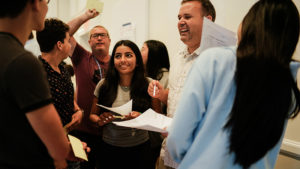
Christy Guan, EFL ’22, a senior at Hockaday School in Dallas, Texas, participated in the Economics for Leaders program at Washington University. She appreciated the interactive lectures that helped her understand key economic concepts.
“At EFL, lectures were interactive, providing an environment to ask questions to ensure understanding,” Guan said. “The lectures were always followed with activities that modeled the concepts we covered, which proved key in allowing the knowledge to easily stick in my mind. I can undoubtedly say that during my economics class this year, I will use the knowledge I gained to solidify my understanding of economics.”
High school students with a basic economic background had the option of enrolling in the Economic Forces in American History (EFAH) program at the advanced college level. These students gained a better understanding of how economists analyze human behavior to foresee social outcomes.
This year’s EFAH program was held at Yale University with 27 high school participants. Dr. Phil Magness, senior research faculty and director of research and education at the American Institute for Economic Research and Dr. Taylor Jaworski, associate professor of economics at the University of Colorado, Boulder taught students the history of economics.
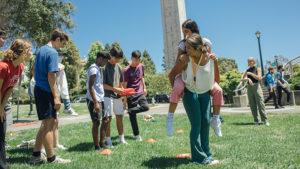
This past summer TFAS launched its newest high school program, Entrepreneurship in the Global Economy (EGE). The program gave students a grasp of the economics concepts necessary for entrepreneurs to succeed as well as the traits necessary to run an effective business in the modern economy.
This year’s program was held at the University of Chicago with 22 high school participants. Students were not only taught by Dr. Don Fell, director of E&E (Environment and the Economy) and One Day Programs for FTE but they also had an opportunity to attend sessions with guest speakers who shared practical experiences of entrepreneurship in the real world.
Teacher Programs
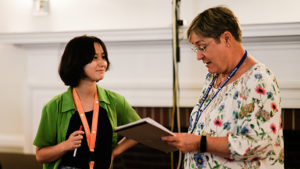
Teachers also have an opportunity to expand their knowledge further through TFAS’s Teacher Programs. This past summer more than 200 teachers of economics, social studies, civics, history and government attended in-person and virtual programs, learning how to become more effective educators. After completion of the program, teachers can confidently return to their students at home with new classroom strategies.
Dr. Don Fell and Dr. David Dieterle, professor of economics at Walsh College, Dr. Ken Leonard and Dr. Robert Whaples, professor of economics at Wake Forest University created a stimulating and positive academic setting for teachers participating in in-person programs. These programs included Environment & the Economy, Economic Issues for Teachers, Right Start in Teaching Economics, Economics for Teachers and Economic Forces in American History.
Online, asynchronous courses offered for teachers throughout the year included Economics of Disasters Online, Economics Online for Teachers: Fundamentals, Economics Online for Teachers: Institutions, Economic Demise of the Soviet Union Online and Economics and Environmentalism Online.
Virtual One Day programs included the above topics, as well as Making Sense of the Federal Budget, Debt & Deficits, Issues of International Trade, Is Capitalism Good for the Poor? and Economic Forces in American History.
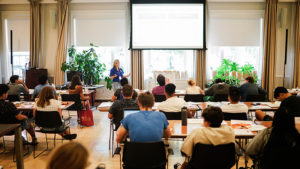
Teacher Kimberly McCabe, participated in the Environment & the Economy program in Proctorville, Vermont. She shared that this program allowed her the chance to learn more about teaching economics from more seasoned instructors.
“FTE offered the opportunity for teachers who have little experience teaching economics to work hand in hand with those who have much experience,” McCabe said. “This allowed great communication and discussion as well as deeper learning for all involved.”
Christian Scott, another educator who also participated in the Environment & the Economy program, shared how FTE offers teachers more than just economics skills.
“These programs have something to offer teachers in many disciplines besides economics and the program works hard to make it fun and engaging,” Scott said.
TFAS is proud to have more than 14,000 student alumni of its high school programs and 21,600 alumni of its teacher programs from all 50 states. Since the establishment, FTE has remained committed to its mission to create an active learning environment with engaging activities and lessons to teach economics. To learn more, visit FTE.org.

